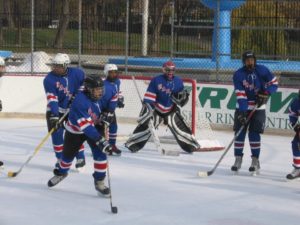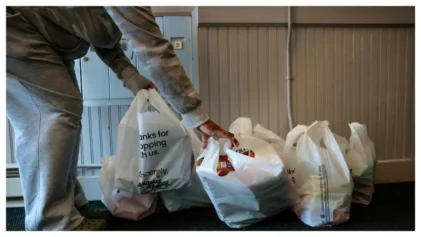
Children play hockey (Ice Hockey in Harlem/Facebook)
Five NHL teams are teaming up with inner-city organizations to increase the diversity of its prospects and fan base. Teams across the country from Illinois to California are partnering with nonprofits in efforts that could give Black children access to hockey, a sport usually regulated to suburban areas.
According to Rolling Stone, the Chicago Blackhawks are partnering with 1st Goal Foundation’s Hockey On Your Block, the San Jose Sharks are teaming up with the Sharks Ice Hockey League in Oakland, California, the Philadelphia Flyers are joining with the Ed Snider Foundation, the Fort DuPont Ice Hockey Club in Washington, D.C, the longest-running nonwhite youth hockey organization, has a relationship with the Washington Capitals team, while the Rangers are linked to New York’s Ice Hockey in Harlem.
Hockey in Harlem’s executive director John Sanful acknowledged the high costs of the sport’s equipment, which can reach into the thousand-dollar range.
“Hockey is an expensive sport. We try to introduce the sport to nontraditional communities,” Sanful said. “Kids these days have seen [Nashville Predators defenseman] PK Subban and [Blue Jackets defenseman] Seth Jones and now want to give the sport a shot. Seeing Subban and Jones motivates and inspires them.”
Blackhawks Fan Development Senior Director Annie Camins hopes to eliminate the cost of playing altogether with their youth hockey program “Get Out and Learn.”
“They learn about hockey, they learn about teamwork and they learn about the sport,” Camins said, adding that a rink is under construction near Chicago and should be open next year. Through the G.O.A.L. program, the Blackhawks bring the rink to youths, while providing them with all necessary hockey equipment.
Jamal Mayers, a retired Stanley Cup-winning Blackhawk, now serves as a community liaison for the team. He explained once a new sheet is put in place at the team’s United Center facility, all hurdles will be cleared.
“We’re going to bus the kids to the facility,” he said. “Ice time and equipment will be taken care of. Making the next NHL hockey players is possible but it’s more about letting kids know that it is possible.”
However, increasing the sport’s diversity isn’t just a monetary issue. It’s a problem of perception. Blogger William Douglas, who began playing hockey at age 13, put it this way: “In our community, people still think it is a white sport. My Black friends thought I was out of my mind. Your friends might rag on for playing, but it is up to the person if they want to learn how to play the game.”


